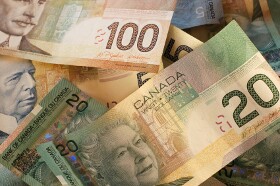The Canadian dollar climbed against its most-traded peers, emerging as the strongest major currency today. The combination of robust inflation and resilient prices for crude oil was the reason for the currency’s amazing performance.
Statistics Canada reported that the seasonally adjusted Consumer Price Index rose by 2.2% in November, year-on-year, accelerating from October’s 1.9% rate of growth. The reading matched expectations. Excluding gasoline, the CPI rose by 2.3%. On a seasonally adjusted monthly basis, the index rose by 0.1% following the 0.3% increase in October. One of the highlights in the report was the increase of energy prices by 1.5% in November that followed the 2.9% drop in October.
Robust inflation eased pressure on the Bank of Canada to cut interest rates. But some analysts argued that the central bank will pay more attention to next week’s GDP report. The data on gross domestic product will be released on Monday, and economists are afraid that it will show another month of sub-par growth. That may encourage the BoC to ease its monetary policy to bolster economic growth.
Prices for crude oil were about flat today even after US crude oil inventories shrank less than was anticipated. While at least in part that can be attributed to slowing holiday trading, market analysts considered it a good sign nonetheless. The Canadian economy strongly relies on oil to generate export revenue, therefore good news related to crude tend to have a positive effect on the currency of Canada.
USD/CAD slumped from 1.3158 to 1.3109 as of 21:35 GMT today. EUR/CAD sank from 1.4668 to 1.4570. CAD/JPY climbed from 83.17 to 83.59.
If you have any questions, comments, or opinions regarding the Canadian Dollar, feel free to post them using the commentary form below.
Canadian Dollar Gets Boost from CPI & Crude Oil Prices
